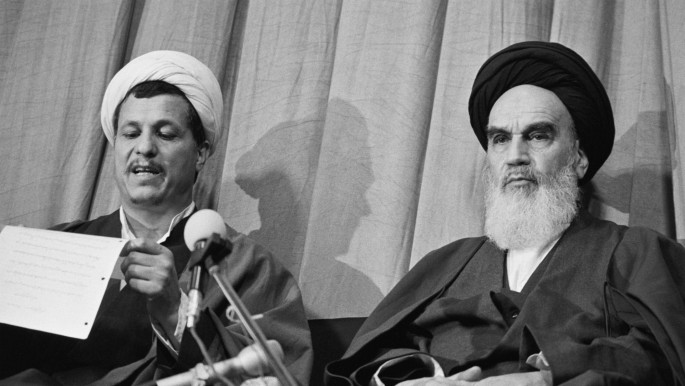
Khamenei beef: Posthumous diss to late, fallen comrade Rafsanjani
In a statement, released late on Sunday and posted on his personal website, Khamenei seemed to ignore/scorn Rafsanjani's status as an Ayatollah, the highest spiritual rank a cleric can reach within Shia Islam, referring to him instead as a "Hujat al-Islam", a lower ranking clerical position.
"It is with deep regret and sorrow that I have received the news on the passing away of an old friend, a comrade and companion during the struggles of the Islamic movement, who was also a close colleague in the Islamic Republic of Iran over the last several years," said Khamenei in the statement.
"His Eminence Hujat al-Islam wal Muslimeen, Sheikh Akbar Hashemi Rafsanjani.
Later in the statement Iran's Supreme leader said that despite "his unique intelligence and friendship" in recent years "there were many hardships and difficult moment we endured".
Khamenei's apparent slight seems all the more pointed considering many of Khamenei's opponents have argued his designation as an Ayatollah is based on dubious foundations.
This argument stems from the fact that less than a year before Khamenei inherited power from the founder of the Islamic Revolution Ayatollah Ruhollah Khomeini he was officially ranked as a Hujat al-Islam.
However, Khomeini, upon choosing Khamenei as his succesor, rather than other candidates already ranked as Ayatollahs, ensured the current Iranian Supreme leader received the title Ayatollah from a theological school in Qoms shortly before his death in June 1989 in order to ease the succesion process.
 |
| Rafsanjani pictured with Ayatollah Ruhollah Khomeini, the founder of the Islamic Republic of Iran, in 1979 [Getty] |
A stalwart of the revolution
Analysts have predicted that Rafsanjani's death could constitute a considerable blow for Iran's reformists and moderates and embolden hardline anti-American elements of Iran's leadership damaging chances at improving relations with the US, at a time when President-elect Trump is set to take power and has previously vowed to renege last year's flagship nuclear deal.
Born to a family of farmers in 1934 Rafsanjani studied under Khomeini in Qoms and played a pivotal role in Iran's 1979 revolution, spending time imprisoned under the Shah.
He served as Iran's acting commander-in-chief during the Iran-Iraq War between 1980-88, was seen as a pragmatic figure in pushing Ayatollah Khomeini to accept the UN Security Council resolution that brought that conflict to an end, and served as President from 1989 to 1997.
During the 80s Rafsanjani also notably became embroiled in the Iran-Contra affair that rocked the Reagan administration and at the time constituted arguably the biggest political scandal witnessed in Washington since Watergate.
 |
| Rafsanjani's relationship with Iranian Supreme leader Ayatollah Ali Khamenei became strained in recent years [Getty] |
A wily political operator
Despite additional accusations of presiding over state-sponsored repression of dissidents in the 1980s, in his later years Rafsanjani was increasingly viewed as a moderate, pragmatic figure advocating for progressive economic policies, the growth of the private sector, and infrastructure development programs.
He notably backed moderate political figures such as Mohammad Khatami, current President Hassan Rouhani and last year's historic nuclear deal signed by Tehran with Washington and other world powers.
For such reasons, in addition to allegations of corruption and amassing a massive personal fortune by segueing his political influence into business opportunities his relationship with Khamenei soured, becoming prickly, leading to occasional wars of words.
However, he remained close to power until his death, most recently serving as head of Iran's Expediency Council, a position that attempts to arbitrate disputes between the parliament and Guardian Council, composed of six clerics appointed directly by the Supreme leader, who serve as the country's top executive body.
Follow Martin Armstrong on Twitter: @MKLArmstrong




